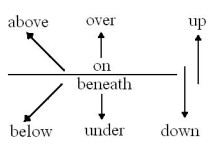出国留学网高考频道在考试后及时公布各科高考试题答案和高考作文及试卷专家点评,请广大考生家长关注。时光飞逝,暑假过去了,新学期开始了,不管情愿与否,无论准备与否,我们已走进高三,走近我们的梦!祝愿决战2014高考的新高三学员能倍加努力,在2014年高考中也能取得优异的成绩。
介词
介词又叫做前置词,是一种虚词,不能单独在句子当中担当成分,它后面必须接名词、代词或相当于名词的其他词类搭配(介词+宾语)构成介词短语;和动词搭配构成短语动词,然后才能够在句子当中充当成分。
介词分为简单介词,如:at, in, on, besides, since, for等;合成介词,如:inside, outside, without, within, into, onto等;短语介词(或成语介词),如:because of, in front of, instead of, in spite of等;二重介词,如:from behind, until after等。
一、介词短语的句法功能
介词在句子中可以充当定语、状语、表语、以及宾语补足语等。
1. 作定语
介词短语在句中做定语时须位于被修饰词之后。
The key to the door is missing.
The water-tower in front of our school was built in 1988.
2. 作表语(或称为:主语的补足语)
Some students are in the classroom, and some on the playground.
As we know, Japan is to the east of China.
3. 作宾语补足语(或称为:宾语的表语)
Did you see a pen under my desk this morning?
They have sent another rocket into the sky.
4. 作状语
1) On Sundays, the family are mostly out. (时间状语)
2) On top of the hill stands a TV tower. (地点状语)
3) He is used to sleeping with all the windows open. (伴随状语)
4) In the search for the lost child, the villagers went all out. (目的状语)
5) All the work must be done by hand. (方式状语)
6) At times, I go to the cinema. (频度状语)
7) She is by far the best student in our class. (程度状语)
8) Because of poverty, he couldn’t go to school. (原因状语)
9) To my surprise, he got the first prize in the contest. (结果状语 / 或评注性状语)
10) Without our Party, we couldn’t live a happy life. (条件状语)
11) In spite of great efforts we failed to carry our plans through. (让步状语)
12) As a matter of fact, nobody agreed to his project. (评注性状语)
In my opinion, you’d better go with us.
二、介词的复合结构
“介词+宾语+补足语”可以构成介词的复合结构,在句子当中可充当表语、定语、状语、补语等。这种结构中的宾语和补足语之间存在着逻辑上的主谓关系,使得句子意义更加丰富。常见的这类介词有with, without, like, of等。
1. 介词+宾语+形容词
He is used to sleeping with all the windows open.
2. 介词+宾语+分词
Bamboo leaves swing in the wind like slim fingers reaching to touch something.
At the beginning of school, the noise of desks being opened and closed and lessons (of being) repeated at the top of the children’s voices could be heard out in the street.
The wounded boy glared at the nobleman with his teeth clenched.
3. 介词+宾语+不定式
The cat humped its back just like a fierce tiger to jump upon me.
4. 介词+宾语+副词
The little boy rushed out of the house without anything on.
5. 介词+宾语+介词短语
The teacher entered the classroom with a book under his arm.
三、介词的叠用
在少数介词之后还可接另一个介词短语,也就是我们所称的二重介词。如:
The naughty boy suddenly rushed out from behind the tree to frighten the girl.
In the spring, new bamboo shoots come out from around their own roots.
He kept on working until after lunch.
四、介词+and+介词
有些介词短语用两个意义相反的介词构成从而使句子精简化。
Not knowing what to do, the worried officer walked up and down the room.
五、介词与其同形的与副词区别
有些介词可做副词用,但我们知道副词可以单独在句子中担当成分,而介词须加宾语构成短语才可在句子中充当成分。
试比较:
Please come in. (in为副词 = into the room)
We have no car, but we can go there without. (without为副词 = without a car)
Although the exam was difficult, I managed to get through. (through为副词 = through the exam)
六、常易混用介词的区别
1. 表示“上、下”等方位的介词。见下图:
2. 表示地点的in和at的区别
a) at表示位置,in表示“在„内”如:
— Where is he? — He is at the cinema. (问话者想知道的是位置)
— Is he in the cinema? — Yes, he is. (问话者可能已经在影院门外)
b) at表示小地点,in表示大地点
They arrived at the village at seven.
They arrived in Beijing at seven.
但若某一个大地点并不是最后的终点,仍然用at。例如:
The train from Beijing to Guangzhou will arrive at Wuhan at twelve o’clock.
(武汉只是从北京开往广州这趟列车途中的一个站,并非目的地。)
3. in, to和on在方位名词前的区别
in表示在某范围之内;to表示某范围之外的地方;on表示“毗邻、接壤”
Taiwan lies in the east of China.
Taiwan lies to the east of the mainland of China.
Mongolia (蒙古) is (lies) on the north of China.
4. 表示时间的in和after
用于将来时态时,in后面接“时段”;after后面接“时点”。试比较:
He will be back in five hours.
He will be back after five o’clock.
after后面也可接“时段”,但应该用在过去时态的句子中。
They came back after five days.
5. 表示时间的at, in和on

1) at表示“钟点时刻、黎明、正午、黄昏、夜晚、午夜、周末、节日期间”
He often gets up at daybreak (dawn).
They will begin their journey at New Year.
2) in表示“上(下)午、晚间、星期、月份、年份、世纪”
He was born in 1988.
3) on表示具体日期或具体的上(下)午,节日的当天,美国英语周末前也用on.
He died on the morning of August 15th, 1985.
但若morning, afternoon, evening等词前面有early或late等修饰语则仍然用in。如: He died in the early morning of August 15th, 1985.
6. 表时间的since和for
since后接时点;for接时段,均常与完成时态连用。
He has been here since last Friday.
He has been here for five days.
当表示“多少次” 时不能用for; 表示“第几次”位于句首时须加for,而位于句尾时for可以省略也可保留。
He has been to Beijing three times. (不可用for three times)
For the first time, I have come here.
I have come here (for) the first time.
7. 表示位置的between和among
between表示“个与个之间”,并非只能指两者,可用“„and„”也可接复数名词。如: The teacher sat between Tom, Jack, Kate, Jane and Mary.
You’d better eat nothing between meals.
among则笼统地指“在„之中”,后接复数名词或代词。
The teacher sat among the students.
8. except, besides, but, except for, but for, except that/ when
1) except用作介词,意为“除了”。整个句子所表达的意思重点在except所构成的介
词短语上。例如:
Nobody felt anxious except him. (只有他才焦虑不安)
2) except 和 besides
两者都有“除去”之意,但前者指“但并不包括”,是“排除”之意;后者指“除此之外还有”,有“外加”之意。例如:
There are six of us besides Tom. (除汤姆外,另外我们还有6个人。)
3) except和 but
but用作介词时,意思是“除„外”,“别无„”,“只有„”;but多与no one,nothing,who,all,everyone等连用,它可与except互换。例如:
No one but a fool would believe it.
Who but he would do such a thing?
4) except for 和 except that/when
二者意为“只是”或“除„外”,表示理由或细节,修正前面所说的情况。except for后面接单词,except that/when后面接句子。整个句子所表达的意思重点在主句中,而except所构成的介词短语只是次要的。例如: Your composition is good except for a few spelling mistakes.
(= Your composition is good except that there are a few spelling mistakes.) 比较:All the compositions are good except Li Hua’s. (大家的作文都好,只有李华的除外。) 5) except for和but for
except for用于陈述语气,but for用于虚拟语气“要不是„”。例如: Except for its temples,the place is not worth seeing. But for your help, I couldn’t have finished the work on time.
6) except but十动词不定式(可带to或不带to,当but或except之前没有动词“do”
的某种形式时,其后的不定式要带to。)例如:
They did nothing except/but watch TV.
I could not do anything except/bur just wait for him to come round.
| 高考语文复习资料 | 高考数学复习资料 | 高考英语复习资料 | 高考文综复习资料 | 高考理综复习资料 |
| 高考语文模拟试题 | 高考数学模拟试题 | 高考英语模拟试题 | 高考文综模拟试题 | 高考理综模拟试题 |
| 高中学习方法 | 高考复习方法 | 高考状元学习方法 | 高考饮食攻略 | 高考励志名言 |



